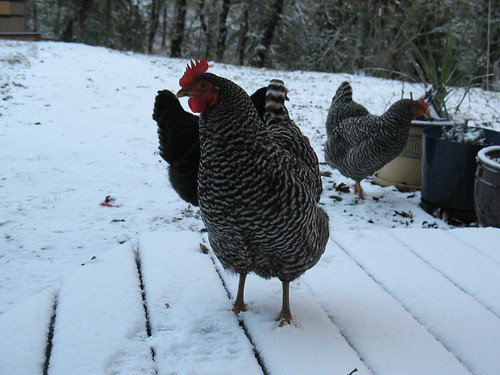I called Keith from work as I usually do on my dinner break the middle of last week, and he answers the phone with something clever, like, "Keith's butcher shop." After some confusing back and forth, I finally clued that he was in process of plucking one of our chickens. Apparently when he pulled up into the driveway in the late afternoon, he noticed a large bird fly away from off the driveway, leaving behind one of our dead chickens. The bird was a red-tailed hawk that we have seen lurking around lately, and the chicken was our one and only Speckled Sussex. It was a clean kill and a fresh bird, so Keith did the practical thing and took it in and saved it for our dining pleasure. He was nice enough though to save the actual gutting and cleaning of the insides for me since I was so "experienced" at it. What a fun task to come home to.
It was interesting how skittish the chickens remained for the next couple days after the Speckled's demise. Any little flutter or even movement by us, and they were skittering all about in a tizzy. Maybe this will teach them to not hang out in the wide open so much and instead stick to the trees. Not likely.
She gave us lots of eggs and a nice meal the other night, so it wasn't all for naught. The meat was a bit on the gamey side (as Keith said, "these birds are athletes compared to what you buy in the store") but good nonetheless. The question remains as to how much longer the rest of our ladies will last. The word in this neighborhood is that once a predator finds your chickens, it doesn't take long for the rest to get picked off. Aside from shooting the hawk (which isn't allowed), not letting the chickens out of the coop, or putting a net above our property, there isn't much we can do except wait, watch and hope for the best.
We have officially stopped counting the eggs. We are just taking a mental note each day as to how many they are giving us and keeping a rough total. With the 12 remaining birds, we are getting about 9-10 eggs a day. Which brings our total to about 1300 eggs, and the cost per egg at $0.75 and thus the cost per dozen at $8.96.
These birds have lived up to their reputation and have done very well in the many cold snaps we have had this winter so far. We've had several nights dipping into the 20's and they did fine in their relatively large coop with no heating light or anything. The only hard part was trying to keep their water thawed.

No comments:
Post a Comment